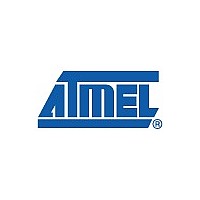ATMEGA64-16MJ Atmel, ATMEGA64-16MJ Datasheet - Page 285

ATMEGA64-16MJ
Manufacturer Part Number
ATMEGA64-16MJ
Description
IC MCU AVR 64K 5V 16MHZ 64-QFN
Manufacturer
Atmel
Series
AVR® ATmegar
Specifications of ATMEGA64-16MJ
Core Processor
AVR
Core Size
8-Bit
Speed
16MHz
Connectivity
I²C, SPI, UART/USART
Peripherals
Brown-out Detect/Reset, POR, PWM, WDT
Number Of I /o
53
Program Memory Size
64KB (32K x 16)
Program Memory Type
FLASH
Eeprom Size
2K x 8
Ram Size
4K x 8
Voltage - Supply (vcc/vdd)
4.5 V ~ 5.5 V
Data Converters
A/D 8x10b
Oscillator Type
Internal
Operating Temperature
-40°C ~ 85°C
Package / Case
64-MLF®, 64-QFN
Lead Free Status / RoHS Status
Lead free / RoHS Compliant
- Current page: 285 of 392
- Download datasheet (8Mb)
Using the SPM
Interrupt
Consideration While
Updating BLS
Prevent Reading the
RWW Section During
Self-programming
Setting the Boot
Loader Lock Bits by
SPM
EEPROM Write
Prevents Writing to
SPMCSR
2490Q–AVR–06/10
If the SPM interrupt is enabled, the SPM interrupt will generate a constant interrupt when the
SPMEN bit in SPMCSR is cleared. This means that the interrupt can be used instead of polling
the SPMCSR Register in software. When using the SPM interrupt, the Interrupt Vectors should
be moved to the BLS section to avoid that an interrupt is accessing the RWW section when it is
blocked for reading. How to move the interrupts is described in
Special care must be taken if the user allows the Boot Loader section to be updated by leaving
Boot Lock bit11 unprogrammed. An accidental write to the Boot Loader itself can corrupt the
entire Boot Loader, and further software updates might be impossible. If it is not necessary to
change the Boot Loader software itself, it is recommended to program the Boot Lock bit11 to
protect the Boot Loader software from any internal software changes.
During Self-programming (either Page Erase or Page Write), the RWW section is always
blocked for reading. The user software itself must prevent that this section is addressed during
the Self-programming operation. The RWWSB in the SPMCSR will be set as long as the RWW
section is busy. During Self-programming the Interrupt Vector table should be moved to the BLS
as described in
the RWW section after the programming is completed, the user software must clear the
RWWSB by writing the RWWSRE. See
page 287
To set the Boot Loader Lock bits, write the desired data to R0, write “X0001001” to SPMCSR
and execute SPM within four clock cycles after writing SPMCSR. The only accessible Lock bits
are the Boot Lock bits that may prevent the Application and Boot Loader section from any soft-
ware update by the MCU.
See
Flash access.
If bits 5..2 in R0 are cleared (zero), the corresponding Boot Lock bit will be programmed if an
SPM instruction is executed within four cycles after BLBSET and SPMEN are set in SPMCSR.
The Z-pointer is don’t care during this operation, but for future compatibility it is recommended to
load the Z-pointer with 0x0001 (same as used for reading the Lock bits). For future compatibility
It is also recommended to set bits 7, 6, 1, and 0 in R0 to “1” when writing the Lock bits. When
programming the Lock bits the entire Flash can be read during the operation.
Note that an EEPROM write operation will block all software programming to Flash. Reading the
Fuses and Lock bits from software will also be prevented during the EEPROM write operation. It
is recommended that the user checks the status bit (EEWE) in the EECR Register and verifies
that the bit is cleared before writing to the SPMCSR Register.
Bit
R0
Table 108
for an example.
and
“Interrupts” on page
7
1
Table 109
6
1
BLB12
for how the different settings of the Boot Loader Bits affect the
5
61, or the interrupts must be disabled. Before addressing
BLB11
“Simple Assembly Code Example for a Boot Loader” on
4
BLB02
3
BLB01
2
“Interrupts” on page
1
1
ATmega64(L)
0
1
61.
285
Related parts for ATMEGA64-16MJ
Image
Part Number
Description
Manufacturer
Datasheet
Request
R

Part Number:
Description:
Manufacturer:
Atmel Corporation
Datasheet:

Part Number:
Description:
Manufacturer:
ATMEL Corporation
Datasheet:

Part Number:
Description:
Manufacturer:
ATMEL Corporation
Datasheet:

Part Number:
Description:
IC AVR MCU 64K 16MHZ 5V 64TQFP
Manufacturer:
Atmel
Datasheet:

Part Number:
Description:
IC AVR MCU 64K 16MHZ 5V 64-QFN
Manufacturer:
Atmel
Datasheet:

Part Number:
Description:
IC AVR MCU 64K 16MHZ COM 64-TQFP
Manufacturer:
Atmel
Datasheet:

Part Number:
Description:
IC AVR MCU 64K 16MHZ IND 64-TQFP
Manufacturer:
Atmel
Datasheet:

Part Number:
Description:
IC AVR MCU 64K 16MHZ COM 64-QFN
Manufacturer:
Atmel
Datasheet:

Part Number:
Description:
MCU AVR 64KB FLASH 16MHZ 64TQFP
Manufacturer:
Atmel
Datasheet:

Part Number:
Description:
MCU AVR 64KB FLASH 16MHZ 64QFN
Manufacturer:
Atmel
Datasheet:

Part Number:
Description:
IC AVR MCU 64K 16MHZ IND 64-QFN
Manufacturer:
Atmel
Datasheet:

Part Number:
Description:
IC MCU AVR 64K 5V 16MHZ 64-TQFP
Manufacturer:
Atmel
Datasheet:

Part Number:
Description:
MCU 8-Bit ATmega AVR RISC 64KB Flash 5V 64-Pin TQFP T/R
Manufacturer:
Atmel
Datasheet:

Part Number:
Description:
DEV KIT FOR AVR/AVR32
Manufacturer:
Atmel
Datasheet:










